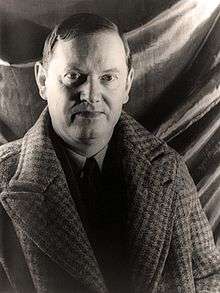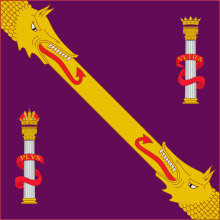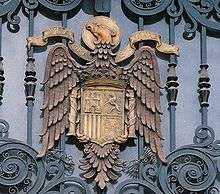One thing that I am sure of, and which I can answer truthfully, is that whatever the contingencies that may arise here, wherever I am there will be no Communism.
Francisco Franco Bahamonde (4 December 1892 – 20 November 1975), commonly referred to as Francisco Franco, was a military generalísimo, leader of Spain (Caudillo de España) from October 1936 (whole country from April 1, 1939 on), and de-facto regent of the nominally restored Kingdom of Spain from 1947 until his death in 1975.
Quotes
- One thing that I am sure of, and which I can answer truthfully, is that whatever the contingencies that may arise here, wherever I am there will be no communism.
- In discussion with Niceto Alcalá-Zamora, as quoted in Francisco Franco : The Times and the Man (1938) by Joaquin Arraras, p. 159
- We strive to form a single national front against the [[[Masonic]] lodges, against Moscow and the Marxist societies.
- Statement in El defensor de Córdoba (24 July 1936), as cited by Javier Navarrete in Más Allá
- All is well, thank God... but victory will not be complete, definitive or stable, as long as Masonry is in our Spain. And how will it disappear? What to do? Ask Mussolini.
- Statement in El defensor de Córdoba (2 October 1936), as cited by Agustín Celis
- Fascism, since that is the word that is used, fascism presents, wherever it manifests itself, characteristics which are varied to the extent that countries and national temperaments vary. It is essentially a defensive reaction of the organism, a manifestation of the desire to live, of the desire not to die, which at certain times seizes a whole people. So each people reacts in its own way, according to its conception of life. Our rising, here, has a Spanish meaning! What can it have in common with Hitlerism, which was, above all, a reaction against the state of things created by the defeat, and by the abdication and the despair that followed it?
- Franci Interview with Henri Massis, 1938. Quoted in Massis's book Chefs, Paris,Plon 1939.Also quoted in Richard Griffiths, An Intelligent Person's Guide to Fascism. London : Duckworth Publishing, 2000.
- We do not believe in government through the voting booth. The Spanish national will was never freely expressed through the ballot box. Spain has no foolish dreams.
- Statement during the civil war, cited in 1938 by TIME Magazine,, also cited in John A. Crittenden, Parties and elections in the United States, Prentice-Hall, 1982, (p.6).
- Un estado totalitario armonizará en España el funcionamiento de todas las capacidades y energías del país, que dentro de la Unidad Nacional, el trabajo estimado como el más ineludible de los deberes será el único exponente de la voluntad popular.
- A totalitarian state will harmonize in Spain the operation of all the capabilities and energy in the country, that inside the National Unity, the work esteemed as the most unavoidable must be the only exponent of the people's will.
- Victory speech in Madrid (19 May 1939), quoted in Espana Nuevo Siglo (1997) by Tim Connell and Juan Kattán-Ibarra, p. 174
- A totalitarian state will harmonize in Spain the operation of all the capabilities and energy in the country, that inside the National Unity, the work esteemed as the most unavoidable must be the only exponent of the people's will.
- Let us be under no illusion. The rebellious spirit which was responsible for the alliance of large-scale capital with Marxism and was the driving force behind so many anti-Spanish revolutionary agreements, will not be got rid of in a day.
- Victory speech in Madrid (19 May 1939)
- We have torn up Marxist materialism and we have disorientated Masonry. We have thwarted the Satanic machinations of the clandestine Masonic superstate. Despite its control of the world’s press and numerous international politicians. Spain’s struggle is a Crusade; as soldiers of God we carry with us the evangelism of the world!
- Speech to the women’s section of the Falange in Madrid (11 September 1945), as quoted in "Freemasonry and the Spanish Civil War" by Matthew Scanlan.
- The whole secret of the campaigns unleashed against Spain can be explained in two words: Masonry and Communism... we have to extirpate these two evils from our land.
- Writing under the alias Jakin Boor in the journal Arriba in an article, "Masonry and Communism" (14 December 1946), as quoted in Franco: A Biography by Juan Pablo Fusi Aizpurúạ, p. 71
- The defence of internal peace and order constitutes the sacred mission of a nation's armed forces and that is what we have carried out.
- As quoted in The Tyrants : 2500 Years of Absolute Power and Corruption (2006) by Clive Foss, p. 143, ISBN 1905204965
- The Spanish Republic did not find itself free of obligations. For the most part the leaders were Freemasons. Before their duty to their country came their obligations to the Grand Orient. In my opinion, Freemasonry, with all its international influence, is the organization principally responsible for the political ruin of Spain, as well as the murder of Calvo Sotelo, who was executed in accordance with orders from the Grand Secretary of Freemasonry in Geneva.
- Interview with Spanish journalist Nena Belmonte, as quoted in "Freemasonry and the Spanish Civil War" by Matthew Scanlan.
Quotes About Franco
.jpg)
Franco's own ideology was deeply conservative but it was subordinated to the perputation of his own power. He maintained control by repeatedly shifting the balance of influence within the regime according to internal and external pressures, and he continued to command loyalty by allowing the self-enrichment of his elites through the institutions of the state ~ Sebastian Balfour

If I were a Spaniard I should be fighting for General Franco. As an Englishman I am not in the predicament of choosing between two evils. I am not a Fascist, nor shall I become one unless it were the only alternative to Marxism. It is mischievous to suggest that such a choice is imminent. ~ Evelyn Waugh
- Sorted alphabetically by author or source
- Francisco Franco, the former fascist dictator of Spain, gave the Nazis a list of every Jew in his country in order to facilitate efforts to locate, deport and destroy them, according to a document found recently in a Spanish archive and reported on Sunday by the Spanish daily El Pais.The paper said that in 1941, Spain prepared a list of all 6,000 Jews in its territory and gave it to the architect of the Nazis' Final Solution, Heinrich Himmler...
- The document is an official order, dated May 13, 1941, issued by Franco's chief of security, Jose Maria Finat y Escriva de Romani, to all provincial governors. It instructs them to prepare a list of every Jew in their district, both local residents and foreigners, along with details about "their personal and political leanings, their means of supporting themselves, their commercial activity, the level of threat they constitute and their security classification.
- Ofer Aderet, in "WWII document reveals: General Franco handed Nazis list of Spanish Jews", in Haaretz (22 June 2010)
- Franco's own ideology was deeply conservative but it was subordinated to the perputation of his own power. He maintained control by repeatedly shifting the balance of influence within the regime according to internal and external pressures, and he continued to command loyalty by allowing the self-enrichment of his elites through the institutions of the state.
- Sebastian Balfour, quoted in Spain: A History (2000), edited by Raymond Carr (p.265).
- "Bring us Franco's balls!" the men shouted. "'e ain't got no bloody balls," a voice replied.
- Alvah Bessie, Men in Battle: A Story of Americans in Spain (1939), p. 63
- Every town along the Mediterranean shore was empty and deserted. The road was jam-packed with peasants evacuating toward the north, on mule-back, in donkey-carts, afoot. They looked at us in the cab of the truck, moving against the stream they made, and they kept moving. Hundreds were camped along the roads; hundreds were plodding north toward Barcelona, their few possessions, mattresses, blankets, household utensils, domestic stock, on their backs, in wheelbarrows or on their burros' backs. Little children were walking, holding onto their mother's skirts; women carried babies; older children were driving goats, sheep; old men were helping old women along the road; their faces were impassive, dark with the dust of the roads and fields, lined and worn. Their eyes alone were bright but there was no expression in their eyes. Looking at them you knew what they were thinking: 'Franco is coming; Franco is coming.'
- Alvah Bessie, Men in Battle: A Story of Americans in Spain (1939), p. 134
- Then near-by Tarragona was bombed; the Spanish, British, and American nurses went about their work as the windowpanes rattled and the hideous drumming reverberated throughout the house. We all ran out onto the flagstone terrace to watch the black smoke rise over Terragona, and by morning of the next day the word had come that the Italian Fascist troops had reached the sea at Vinaroz, below Tortosa, cutting Loyalist Spain away from Catalonia, and all traffic had been cut between Barcelona and Valencia. (In Rome, the Pope gave is apostolic benediction to the sacred cause of General Franco.)
- Alvah Bessie, Men in Battle: A Story of American in Spain (1939), p. 146
- We heard- a shithouse rumor?- that we dominated the heights surrounding Lerida and Balaguer (this was different); the newspapers reported that the offensive was gaining ground everywhere; the Non-Intervention Committee met again and issued another of its 'decisions.' This time it was decided once more to withdraw all foreign 'volunteers' from Spain, but England's perfidious hand could be seen as plain as day, for wasn't Mr. Chamberlain interested in concluding an agreement with Banjo-Eyes? And wasn't the 'withdrawal' contingent upon British and French concession of belligerent rights to Franco, which would tip the scales even farther in his favor by legalizing what already existed- the shipment of arms, munitions, planes and tanks and men into his territory?
- Alvah Bessie, Men in Battle: A Story of American in Spain (1939), p. 170
- North's news of Europe was disheartening. Hitler had mobilized a million and a half men on the Czech and French borders, presumably for 'maneuvers'; probably for aggression against Czechoslovakia if the democracies, as they are euphemistically described, remained supine. Roosevelt and Hull had, it is true, made strong speeches against Fascist aggression within the week, and called for united democratic opposition, but when would the talking end and what good would it do? Franco, unlike the Spanish Loyalist Government, had given a categorical refusal to the Non-Intervention Committee's alleged plan for evacuation of foreign volunteers; he did worse, he said he would accept it in exchange for belligerent rights, immediately granted.
- Alvah Bessie, Men in Battle: A Story of American in Spain (1939), p. 297
- General Franco made it clear that Spain could enter the war only when England was about ready to collapse.
- Admiral Wilhelm Canaris. Quoted in The Last European War (1976) by John Lukacs (p. 114).
- I most sincerely wish to go on record as being unalterably opposed to Franco and fascism, to all violations of the legal government and outrages against the people of Republican Spain.
- William Faulkner, 1938, quoted in Frederick Robert Karl, William Faulkner, American writer:a biography (1990), p. 630
- Just like any honest man, I am against Franco and Fascism in Spain.
- Ernest Hemingway, quoted in Writers Take Sides : Letters About the War in Spain from 418 American Authors (1938) by the American Writers League, which asked various authors: "Are you for or are you against Franco and fascism?".
- A great man...and the greatest and most representative of the Spanish people of the 20th century...one of the great leaders we have had in our history.
- Manuel Fraga Iribarne, Spanish Politician and diplomat, on the occasion of Franco's death. Quoted in "Frases que reflejan el recorrido de Manuel Fraga" in GARA Newspaper (16 January 2012)
- A democracy can be highly illiberal, while on the other hand an absolute ruler could be a thorough liberal—without being for this reason the least bit democratic. Even a dictator, theoretically, could be a liberal. [...] A purely military dictatorship based on the bayonets and sabres of a handful of professional soldiers has greater liberal potentialities (one has only to compare Franco, Oliveira Salazar and Pétain with Hitler, Mussolini and Stalin).
- Erik von Kuehnelt-Leddihn (1952). Liberty and Equality: The Challenge of Our Time, Caldwell, Idaho: Caxton Printers, pp. 87-88
- Neither the Nazis nor the Italians were able to cash in on their "investments" in Spain. Franco saw Hitler only once and, as an old specialist on criminals from his days in the Tercio, he immediately sized up his partner.
- Erik von Kuehnelt-Leddihn (1974). Leftism: From de Sade and Marx to Hitler and Marcuse, Arlington House Publishers, p. 271
- The crucial difference was between the regimes of the old Right, who wanted to turn the clock back to a pre-democratic elitist era, and the new Right who seized and sustained power through the instruments of mass politics. The former included General Franco and the Greek dictator Metaxas, men who feared mass politics and allied themselves with bastions of the established order such as the monarchy and the Church...the new radical Right, in contrast, rose to power in Italy and Germany through elections and the parliamentary process.
- Mark Mazower, Dark Continent: Europe's 20th Century (1998), p. 27
- There is no question for any decent, kindly man or woman, let alone a poet or writer, who must be more sensitive. We have to be against Franco and Fascism and for the people of Spain, and the future of gentleness and brotherhood which ordinary men and women want all over the world.
- Naomi Mitchison, in 1937, as quoted in Spanish Front : Writers on the Civil War (1986) by Valentine Cunningham, p. 227
- The most baffling thing in the Spanish war was the behaviour of the great powers. The war was actually won for Franco by the Germans and Italians, whose motives were obvious enough. The motives of France and Britain are less easy to understand. In 1936 it was clear to everyone that if Britain would only help the Spanish Government, even to the extent of a few million pounds’ worth of arms, Franco would collapse and German strategy would be severely dislocated. By that time one did not need to be a clairvoyant to foresee that war between Britain and Germany was coming; one could even foretell within a year or two when it would come. Yet in the most mean, cowardly, hypocritical way the British ruling class did all they could to hand Spain over to Franco and the Nazis. Why? Because they were pro-Fascist, was the obvious answer. Undoubtedly they were, and yet when it came to the final showdown they chose to stand up to Germany. It is still very uncertain what plan they acted on in backing Franco, and they may have had no clear plan at all. Whether the British ruling class are wicked or merely stupid is one of the most difficult questions of our time, and at certain moments a very important question.
- George Orwell, in "Looking Back on the Spanish War" (1943)
- General Franco, whom Sir Winston Churchill has praised as a "gallant Christian gentleman", has forbidden any work of fiction alluding to adultery, though I believe he had made a special exception for the Iliad.
- Bertrand Russell, in Dear Bertrand Russell : A selection of his correspondence with the general public 1950-1968 (1970)
- It is time to visit General Francisco Franco. A short taxi ride does it, and I am deposited at the foot of a giant, prancing stone horse bearing a triumphant-looking granite copy of the dictator.This, the only public statue of the "caudillo (leader) for God and the fatherland" left in Madrid, stands at the gates to the environment ministry. Here, spattered with red paint hurled by protesters and with a few bunches of wilting flowers left by his admirers, General Franco must remain. For the conservative-run city hall has decreed the generalísimo does not deserve to be knocked off his pedestal. Barring a small, remote Caudillo Square and a Franco Street that may or may not be named after him, this is all that remains of the man who ruled Spain for 36 years.
- Giles Tremlett, in "The generalísimo remains on his pedestal" in The Guardian (27 November 2004)
- If I were a Spaniard I should be fighting for General Franco. As an Englishman I am not in the predicament of choosing between two evils. I am not a Fascist, nor shall I become one unless it were the only alternative to Marxism. It is mischievous to suggest that such a choice is imminent.
- Evelyn Waugh, in 1937, as quoted in The Picturesque Prison : Evelyn Waugh and His Writing, (1983) by Jeffrey M. Heath, p. 49
- Franco, that murderous little "Christian gentleman".
- H. G. Wells, in The New World Order (1940)
External links
This article is issued from
Wikiquote.
The text is licensed under Creative
Commons - Attribution - Sharealike.
Additional terms may apply for the media files.

